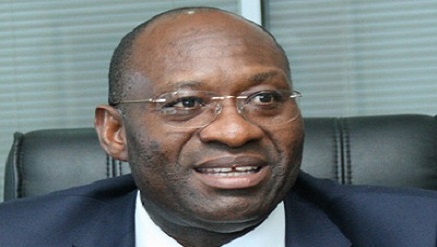E-Financial
Heritage Bank Highlights Customer Experience As Key to Retail Banking Success

Improved customer experience, technology and thorough exploitation of the emerging alternative markets in the non-oil sectors of the Nigerian economy are keys to growing emerging retail banking sector.
This was the submission of Mrs. Mary Akpobome, Heritage Bank’s Executive Director, Ivory Banking, who represented Mr. Ifie Seiko, Managing Director/Chief Executive Officer of the Bank, as a guest Speaker at the 2nd Jeff & O’Brien Roundtable Conference on The Future of Retail Banking in Africa, which took place at the Intercontinental Hotels, Lagos.
According to Mrs. Akpobome, with Nigeria’s over reliance on the oil sector and the effect of the fall in foreign exchange rate, banks need to redefine their retail banking strategies to cater for the emerging retail business opportunities in the nation’s non-oil sector.
“Retail Banking in Nigeria is evolving. Traditional way of Banking is changing. It is going to even change more with the digital age that we are coming into. Reliance and over reliance on Brick and Mortal branches is going to change. Customers are going to have a lot of alternatives as to how to interface with the market. Today, we hear of non-oil sector as alternatives to the oil sector. We can see what over reliance on the Oil sector has done to our economy. If we had focused greatly on these alternatives, the exchange rate would not have hit us as much as it did”, explained Akpobome.
She added that those emerging alternatives, which form large chunk of what today’s Retail Banking need to focus on, include businesses managed by middle-men, farmers, entertainers and other medium-sized businesses that are the new money spinners which have got the banking industry to rethink their customer management strategies.
“What those alternatives have done to the industry is to get banks to rethink their strategies; to rethink the industry they want to play in, to also rethink the market they want to pitch their strategies to ahead of the future, because the future is going to change. Retail banking strategy: means looking at a much wider scope of customers and how to reach them in their respective communities. Is it through alternative banking centre? Is it through Agent-Banking? Is it through cash-point or through other platforms”?
Mrs. Akpobome added that with the successful acquisition of Enterprise Bank by Heritage Bank, the nation’s retail banking service is about to witness the best of retail banking offering established on “unique customer experience, culture of excellence and people skills”.
In his contribution at the Roundtable talk, Group Head, Cowry Banking, Mr. Davidson Regha noted that the success of retail banking in Africa would require partnerships or collaboration of different competencies from other industries to drive innovative and successful retail banking service. He explained how Heritage Bank had successfully created a best-seller education product called SkoolBank with partnership with specialists in the education industry. He also described how the bank had equally partnered professionals in the entertainment industry to grow the rising retail banking demand from the sector.
In his presentation, Mr. John Berry, an International retail banking expert observed that Nigerian banks must build their retail banking strategies around people, processes, products and places with strong emphasis on differentiation to be able to navigate the current changing tides of retail banking.
He noted that to create a successful retail banking system, banks must create a unique culture that differentiates their brands; adding that “it is easy for other brands to copy your pricing but not your unique customer friendly culture”.
Mr. Berry advised that banks must turn their customers into brand advocates through unique experiential services offerings.
“If you are able to turn your customers into advocates, they will buy more products, use the products more regularly, stay longer, tell others about your services and make it more profitable. I will say build a retail brand that is differentiated through functional service and consumer experience”, he admonished.
According to Mr. Pascal Odibo, Group Country Director, Jeff O’Brien, the expectation of his organization regarding the event was “to trigger the conversation and hopefully steer the sector into some radical engagement on the mix of dynamics that will shape who plays, dominates and indeed sets the agenda for Retail Banking in our region in the next decade or two”.
E-Financial
UBA Announces Successful Completion of System Upgrade

United Bank for Africa (UBA) has successfully completed its much-anticipated system upgrade, restoring all banking services to normalcy.

In a message to customers, UBA reassured customers that they could now log in to the mobile app and enjoy a smoother, more efficient banking experience.
The bank acknowledged any inconvenience caused by the process and reaffirmed its commitment to providing top-tier financial services.
“We are pleased to inform you that our mobile app upgrade has been completed, and all services have been fully restored. You can now log in and enjoy a smoother banking experience and improved services,” UBA announced.
While the upgrade promises enhanced functionality and reliability, UBA urged customers experiencing any lingering issues to reach out to its 24-hour Customer Fulfilment Centre via 02012808822 or email [email protected] for prompt assistance.
With the completion of the process, UBA reassured its customers of its dedication to innovation and excellence in banking.
E-Financial
SERAP Gives CBN 48-Hour Ultimatum to Withdraw ATM Fee Hike

Socio-Economic Rights and Accountability Project (SERAP) has called on the Central Bank of Nigeria (CBN) to immediately revoke its recent increase in Automated Teller Machine (ATM) transaction fees, describing the move as “Patently unlawful, unfair, unreasonable, and unjust.”

In an open letter addressed to Olayemi Cardoso, governor, CBN, and dated February 15, 2025, SERAP warned that the fee hike would worsen economic hardship for millions of Nigerians, particularly those at the lower end of the financial spectrum.
The rights group gave the apex bank a 48-hour deadline to reverse the policy or face legal action.
The CBN’s new directive mandated that ATM withdrawals at off-site locations, such as shopping malls, airports, and standalone cash points, will attract an N100 charge per N20,000 withdrawal.
Additionally, a surcharge of up to N500 may apply for transactions conducted at certain locations. The new fees are set to take effect from March 1, 2025.
In its letter, signed by Kolawole Oluwadare, deputy director, SRERAP criticized the policy, arguing that it would disproportionately affect struggling Nigerians while benefiting commercial banks.
“The manifestly unfair increase in ATM transaction fees will hit hardest those at the bottom of the economy and exacerbate the growing poverty in the country,” SERAP stated.
The organization further argued that financial institutions should bear the cost of banking operations, rather than shifting the burden onto customers, particularly those with limited financial means.
SERAP accused the CBN of prioritizing the interests of banks over the welfare of ordinary Nigerians, many of whom already struggle with the high cost of living.
The group pointed out that banks continue to report record-breaking profits while imposing excessive charges on customers.
“CBN policies should not be skewed against poor Nigerians and heavily in favour of banks that continue to declare trillions of naira in profits, mostly at the expense of their customers.
“The increase in ATM transaction fees will inflict misery on Nigerians and contribute to human rights abuses,” the letter read.
SERAP also noted that the policy contradicts President Bola Tinubu’s commitment to tackling poverty in Nigeria.
The rights group argued that the CBN’s action violates multiple legal provisions, including the Nigerian Constitution, the CBN Act, and the Federal Competition and Consumer Protection Act.
SERAP highlighted specific sections of these laws that prohibit unfair business practices and protect consumers from exploitative charges.
According to SERAP, the increase in ATM fees discriminates against low-income Nigerians who may struggle to afford the higher fees, creates a two-tiered financial system that favours the wealthy, contradicts the CBN’s stated mission to promote national economic well-being, and violates international human rights obligations under the United Nations Guiding Principles on Business and Human Rights,
“The CBN has responsibilities under the UNGPs to take effective steps to avoid or mitigate potential human rights harm and to consider ending any charges or transaction fees where severe negative human rights consequences cannot be avoided or mitigated,” SERAP asserted.
“We would be grateful if the recommended measures are taken within 48 hours of the receipt and/or publication of this letter.
“If we have not heard from you by then, SERAP shall take all appropriate legal actions to compel you and the CBN to comply with our request in the public interest,” the letter warned.
E-Financial
FG Seeks Fresh $300m Loan from World Bank for Health Security

Federal government has engaged the World Bank for a fresh $300m loan to strengthen Nigeria’s health security infrastructure.

Information obtained from the World Bank showed that the loan, which is under consideration, will be implemented by the Nigeria Centre for Disease Control (NCDC) with the Federal Ministry of Finance acting as borrower on behalf of the Federal Government.
According to information on the World Bank website, the loan project is expected to “increase regional collaboration and health system capacities to prevent, detect, and respond to health emergencies in the Federal Republic of Nigeria.”
The project is currently in the pipeline stage, with the disclosure date scheduled for February 6, 2025.
The World Bank board is expected to give its approval on July 30, 2025, following necessary assessments. The appraisal is set for April 14, 2025, and implementation will commence in the 2026 fiscal year.
According to a document on the concept of environmental and social review, the Nigeria Health Security Programme aligns with broader government efforts to enhance disease surveillance, diagnostic capabilities, emergency response, and laboratory networks across the 36 states and the Federal Capital Territory.
The programme’s primary objective is to enhance regional collaboration and strengthen Nigeria’s health systems to deal with emergencies. It falls within the World Bank’s investment in health, nutrition, and population sectors across Western and Central Africa.
According to the Environmental and Social Review Summary of the project, HeSP will expand molecular laboratory capacity, upgrade primary healthcare centres, establish emergency operation centres, and construct warehouses.
It will also deploy mobile laboratories and install water, sanitation, and hygiene facilities alongside solar energy systems to support health infrastructure improvements.
Although the total project cost is yet to be determined, the World Bank has committed $300m to the initiative. The funds aim to bolster Nigeria’s pandemic preparedness and improve response mechanisms for public health threats.
The initiative comes as Nigeria strengthens its public health infrastructure following lessons from previous outbreaks, including COVID-19.
If approved, the loan will support the NCDC in improving disease surveillance, diagnostics, emergency response, and laboratory services.
Nigeria has previously secured funding from international financial institutions to boost healthcare resilience, including financing for vaccine procurement, emergency medical services, and infrastructure development.
However, the project, categorised as a high-priority public health intervention, carries substantial environmental and social risks due to potential health, safety, and ecological concerns associated with infrastructure expansion.
Identified risks include increased medical waste, occupational hazards, and heightened energy and water demands.
Social risks range from potential grievances from stakeholders to concerns over land acquisition and implementing health interventions in conflict-prone areas.

 E-Financial1 day ago
E-Financial1 day agoSERAP Gives CBN 48-Hour Ultimatum to Withdraw ATM Fee Hike

 E-Financial1 day ago
E-Financial1 day agoFG Seeks Fresh $300m Loan from World Bank for Health Security

 General News1 day ago
General News1 day agoFG Drops Merger of NCAA, NAMA

 News1 day ago
News1 day agoBinance Chief Insists Some FG Officials, Reps Demand $150m Bribe

 News1 day ago
News1 day agoinDrive Unveils Cashless Bank Transfer Feature in Nigeria

 E-Financial1 day ago
E-Financial1 day agoCardinalStone Acquires Radix Pension Managers

 Telecom1 day ago
Telecom1 day agoNITDA Pledges to Foster Innovation with Cloud Infrastructure and AI Applications

 Telecom11 hours ago
Telecom11 hours agoToriola, MTN Nigeria CEO again Defends Tariff Hikes amidst Backlash














